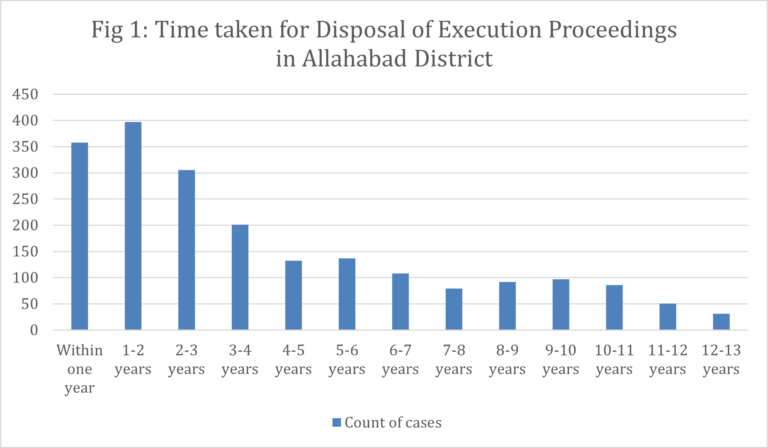

Focusing On Execution Proceedings
Recently, the Supreme Court in M/s Chopra Fabricators and Manufacturers Pvt. Ltd. v. Bharat Pumps and Compressors Ltd. and Anr. (hereinafter Chopra Fabricators) drew attention to the slow pace of execution proceedings pertaining to arbitration awards in the state of Uttar Pradesh. The court ordered the submission of a ‘Status Report’ regarding pendency of execution proceedings arising from the Arbitration Act, 1940 and the Arbitration and Conciliation Act, 1996. The genesis of the case before the Supreme Court can be traced to Execution Petition No. 6 of 2003 pending before the Small Causes Court at Allahabad. The decree holder filed this execution proceedings after receiving a favourable award consequent to an arbitration proceeding. After a wait of nearly 20 years, the decree holder approached the Allahabad High Court under Article 227 for directing the speedy disposal of the execution proceeding. The High Court ordered that whether a matter is urgent is a decision to be made by the court before which the case is pending. Thus, the decree holder was asked to return to the Small Causes Court where the execution proceeding is currently pending.
This High Court order does not take into consideration the Supreme Court’s judgment in Rahul S Shah v. Jinendra Kumar and Ors (hereinafter Rahul S Shah). In this judgment, the Supreme Court laid down directions to ensure speedy execution of decrees, including reiterating that in money suits, the court must, on an oral application ensure immediate execution of the decree. Further, the Supreme Court in Rahul S Shah also directed all the High Courts to accordingly make changes to rules relating to execution of decrees by April 21, 2022 and underlined the importance of technology tools to expedite execution proceedings.
In Chopra Fabricators, the Supreme Court also ordered the collation of statistics and formulation of a road-map to tackle pendency related to execution. To get an idea of the scale of this issue, DAKSH looked at NJDG data from the 75 judicial districts of Uttar Pradesh on the eCourts system. Out of 1,00,13,029 cases pending across the state as of 05.05.2022, execution cases make up 70,267 or 0.70%. It is worth noting that 13,342 of these execution cases have been pending for more than ten years. The petitioners in Chopra Fabricators are far from alone in waiting for an already decided award, without any clarity on when they will receive their due.
DAKSH analysed a sample of 5,149 execution cases from the DAKSH database, filed between 2000 and 2020 in Allahabad district (42% were disposed and 58% were pending as of March 2020). The disposed cases in this dataset took an average of 1630.2 calendar days (roughly 4.47 years) for disposal. The distribution of disposal times for these cases are given in Figure 1 –

In one of the hearings before the Allahabad Small Causes Court, it was submitted that the Respondent company (a public firm) had been sold and its senior officers could not be contacted. Without a clear picture of whom to hold responsible for paying the outstanding award, the Small Causes Court has no way to quickly close the case. The commercial arbitration process is dependent on parties having faith that the decree will be executed in a timely fashion without further harm to their finances; the continuation of drawn-out execution proceedings hurts that faith.
As stakeholders in the Allahabad High Court work to prepare this roadmap, they will face several difficulties that emerge from what judicial data is collected and available for bulk analysis:
- First, “execution proceedings” as they are identified within eCourts data is a broad case type which includes not only arbitration but other cases related to commercial suits, property disputes, money decrees, etc. It is difficult to know how many execution cases were filed under a specific Act & Section, because these fields are often not entered on eCourts. While a road-map is based on the existing procedural impediments contributing to delay, it will benefit from segregating trends influenced by the subject matter of execution proceedings. Understanding nuances in the lifecycle of different kinds of execution cases requires that we pay attention to data categorisation and improve more granular subject-matter related tagging of the cases.
- Second, it is also important to ensure that the record of an execution case is linked to any and all related cases (i.e. the original case number which gave rise to the decree, related matters in the High Court, etc.). Again, while there are fields for this purpose, they are inconsistently filled. This would allow us to understand the execution leg of the various cases in the context of the overall dispute. While the execution case in Chopra Fabricators has been ongoing since 2003, the original award was granted in 1992.
The issue of execution proceedings has come under scrutiny before the Supreme Court last year in Rahul S Shah and now in Chopra Fabricators. The court while directing the Allahabad High Court to furnish data should also consider the observations made in Rahul S Shah wherein the court reiterated the following:
“..Law Commission and the Parliament should bestow their attention to provisions that enable frustrating successful execution. The Court opined that the Law Commission or the Parliament must give effect to appropriate recommendations to ensure such amendments in the Code of Civil Procedure, 1908, governing the adjudication of a suit, so as to ensure that the process of adjudication of a suit be continuous from the stage of initiation to the stage of securing relief after execution proceedings.”
The slow pace of execution proceedings is a rule of law issue that undermines the justice system and needs our undivided attention. It is clear that there is a need to revisit execution proceedings as under the Code of Civil Procedure, 1908 in a holistic manner rather than a piecemeal approach whereby there are temporary directions issued by the court from time to time. It is also important to focus on collating data related to execution proceedings in a streamlined manner to assess and understand the impact of such proceedings.

Sandhya PR

Smita Mutt
RECENT ARTICLES


Civil Disputes, Criminal Justice Resolutions

Set the guardrails for AI use in courtrooms

Why ICAI’s audit limit is misguided and outdated

-
Rule of Law ProjectRule of Law Project
-
Access to Justice SurveyAccess to Justice Survey
-
BlogBlog
-
Contact UsContact Us
-
Statistics and ReportsStatistics and Reports
© 2021 DAKSH India. All rights reserved
Powered by Oy Media Solutions
Designed by GGWP Design